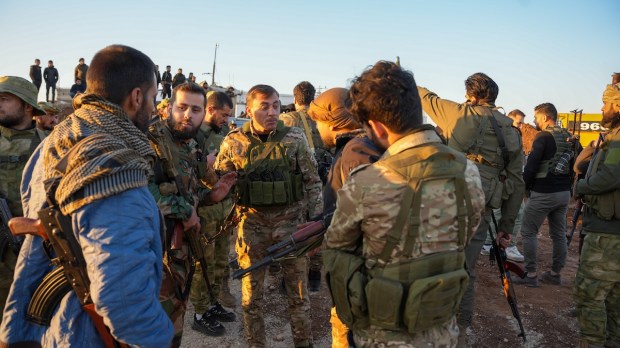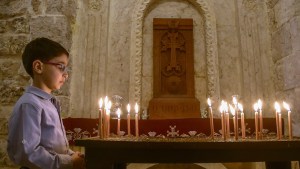A former Church leader in Aleppo said that people in Syria’s second largest city are hoping for a compromise between the government of Bashar al-Assad and rebels who have taken control of the city in the last several days.
“We pray that a compromise and reconciliation can be reached and that a dialogue will make for understanding between the belligerent brothers, so desired by most of the inhabitants of the city,” said the leader, a bishop who wished to remain anonymous, for security reasons.
The dormant Syrian civil war roared back to life late last week when a rebel group, Hayat Tahrir al-Sham (HTS), which had controlled parts of northwestern Syria, moved into Aleppo, the country’s economic and cultural center. HTS, whose Arabic name means “Organization for the Liberation of the Levant,” and other rebel groups claim to have seized control of several towns and villages in the provinces of Aleppo and Idlib.
In an email to Aleteia on Sunday, the bishop described calm but uncertainty.
“The attackers have taken care to reassure the citizens and promise them security and tranquility,” he said. “Let’s hope that their promises hold. Can this last?”
But he also spoke of fears that the Syrian army was preparing to retake Aleppo.
“This worries us greatly, because in this case no one can know what could happen,” he said. “The attackers have taken control of most of the streets and neighborhoods of the city. There will probably be clashes everywhere in the city and carnage. It would be – God forbid – a blind murderous civil war, which could mow down belligerents and innocents alike.”
Islamic principles
Unfortunately, there has already been bloodshed, with over 350 people killed. In addition, thousands are displaced — a number expected to rise, Cardinal Mario Zenari, apostolic nuncio to Damascus, told Vatican News.
The Vatican’s information service also reported that the Franciscan complex of the Holy Land College in Aleppo was heavily damaged by a Russian attack on December 1. The Franciscans of the Custody of the Holy Land said there were no victims.
The college is located in an inner section of the monastery near the church where Mass was scheduled to be celebrated later that same evening.
Russia has been supporting Assad against the rebels, as have Iran and the Lebanese militia Hezbollah.
More than half a million people have been killed in Syria’s civil war, which erupted after the Syrian government brutally cracked down on pro-democracy protests in 2011.
Experts agree that the situation of some of Assad’s international supporters – including Russia in its war on Ukraine and Hezbollah’s degradation by Israel – have encouraged the Syrian opposition to renew their efforts to bring down the regime.
The New York Times said that although HTS has toned down rhetoric about establishing an Islamic caliphate, it still wants to replace the government in Damascus with one inspired by Islamic principles.
“Though the distinction may seem subtle, analysts say the group’s rule — while still deeply conservative, intolerant and authoritarian — has been less brutal and dogmatic than that of the Islamic State, which established a bloody regime in territory it controlled in Iraq and another part of Syria,” The Times said.
The newspaper said that the group remains unpopular among Aleppines, “who have protested repeatedly against its arbitrary arrests, taxation and intolerance of dissent as well as still-miserable living conditions.”
The Times pointed out that in the four years since a cease-fire was brokered by Russia and Turkey, HTS has taken the opportunity to restructure its forces.
“People are tired”
A parish priest in Aleppo, Fr. Bahjat Karakach, said that people are tired “and do not have enough energy to face another battle, the start of another war.”
“The fear is real, palpable,” Fr. Karakach, who is at Aleppo’s Church of St. Francis of Assisi, told AsiaNews November 29.
Fr. Karakach believes the renewed rebel assault is also linked to “the political stalemate of recent years in Syria, when it was clear to everyone that it would not be sustainable in the long run.” In fact, “a real and final solution has never been reached, only fragile deals that could not last.”
A decisive intervention by the international community is more urgent than ever, he said.
Syrians only wish “to escape” their country after so many years of conflict, extreme poverty, international sanctions, an earthquake, and a new wave of violence, according to Cardinal Zenari, the apostolic nuncio.
Christians
The Christian population of Aleppo was slightly more than 250,000 before the Syrian Civil War, representing about 12% of the total population of the city. However, as a consequence of the war, the Christian population of the city decreased to less than 100,000 as of the beginning of 2017.
Fr. Karakach said that as Advent begins, Christians in Aleppo are trying to “live the situation with joy, but the atmosphere has inevitably become heavier and perhaps will not allow us to be so carefree to move and celebrate.”
Added Fr. Hugo Fabian Alaniz, a missionary priest of the Institute of the Incarnate Word, “In this time leading up to Christmas we ask for a very strong message of hope. We also ask for the gift of peace.”
“We ask the Child Jesus to give us the strength to always remain in hope, that hope to which we have been called,” he said in an interview with Fides, the information service of the Pontifical Mission Societies. “Let us not allow all these sufferings and trials to kill the hope in our hearts.”



